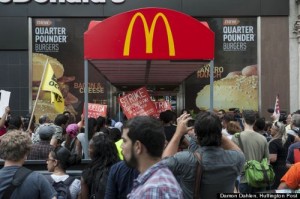McDonald’s Corp. and its franchisees would have to pay more than $8 billion a year in the United States, for its workers to collect a raise from current wages to the $15 per hour demanded by workers striking in seven cities.
The sum needed seems just as huge for Yum! Brands Inc., owner of KFC, Taco Bell and Pizza Hut. The expense of the move to Wendy’s Co. would just as harsh, given its total sales. At Burger King Worldwide Inc., where the company now franchises some 97% of its U.S. restaurants, the impact on the company would be small, but franchisees would be hurt.
 This week’s protests at restaurants owned by and franchised from the big four fast-food chains have as a primary goal improving the wages of low-wage workers at these companies. The federal minimum wage in the U.S. is $7.25. The people who have walked off their jobs are seeking a raise to $15 an hour which seems financially impossible at the moment.
This week’s protests at restaurants owned by and franchised from the big four fast-food chains have as a primary goal improving the wages of low-wage workers at these companies. The federal minimum wage in the U.S. is $7.25. The people who have walked off their jobs are seeking a raise to $15 an hour which seems financially impossible at the moment.
As analyzing the sharp cost increase that a wage raise would introduce, it is unlikely that any of these chains could sustain the financial burden without raising prices, cutting jobs or mix of both. That would concern customers and shareholders.
The stock prices of all fast food companies are based very heavily on net income and cash flow. One of the most attractive aspects of being a McDonald’s shareholder is the company’s history of share buybacks and dividend increases. Dramatic changes in growth are not a part of the financial advantage of the large fast-food companies. Their ability to produce returns based on stock price and yield are what makes them attractive.
According to a report in Forbes, a Big Mac that now costs $3.99 would have to rise to $4.67 to pay for the wage increase. Items on the Dollar Menu would rise to $1.17, and the cost of a Big Mac Meal would rise from $5.69 to $6.66.
Most likely the fast-food restaurants will not raise wages to the levels being demanded by their workers. Such a move would be followed by raising prices to customers, which would most definitely hurt sales, but also it would cut into payouts to shareholders as well. The damage that would be done to the financial status of these companies, and the likely layoffs that would be triggered by that, is the stringest argument against the $15 an hour wage.
McDonalds share price declined 0.46% so far today while having jumped 11% on a year-to-date basis. Yum! brand advanced 0.34% being up 10.39% since the beginning of the year.





